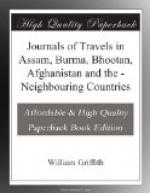Of the numerous villages passed between Bamo and Ava not one deserves especial notice, nor is there one, with the exception of Umeerapoora, the former capital, which contains 500 houses. Shewegyoo, which formerly occupied a considerable extent of the left bank near the south opening of the second Kioukdweng had been burnt by the orders of the Monein Myoowoon, on account of their having supplied troops to the emissaries of the Tharawaddi. Kioukgyee, the residence of the above governor, had a short time before our arrival been invested by a force in the interest of the Tharawaddi, but had been repulsed. The governor was to proceed with the whole population, amounting to several hundred souls, to Bamo, to join his forces with those of the Bamo governor. This part of the country was most unsettled and almost deserted. On reaching Katha the state of the country was more tranquil, all the people below this point having espoused the cause of the Tharawaddi. Katha contains 200 houses, and has a rather respectable bazaar; it is well situated, and has the most eligible site in my opinion, of all the towns hitherto seen. The most remarkable object is a noble Kioung, or Mosque, built by the head-man of the place; this is one of the finest now existing in Burma.
The only other large place is Sheenmaga, about a day’s journey from Ava. This is said to contain 1,000 houses. An extensive fire had lately occurred here. I counted 200 houses, and judging from the extent of the ruins, I should say it might probably have numbered between 4 and 500. There are several villages contiguous to this, and I think that the district immediately contiguous is more populous than any part hitherto seen.
During the above portion of the journey our halts were as follows:—
1. Tapaw.
2. Mogoung river.
3. Mogoung river.
4. Lemar, in the upper Kioukdweng.
5. Bamo.
6. Tsenkan.
7. Kioukgyee.
8. Katha.
9. Tsagaya.
10. Tagoung.
11. Male, at the entrance of the lower Kioukdweng.
12. Kabuet, in the lower Kioukdweng.
13. Male.
14. Menghoon.
15. Ava.
This distance down the Irrawaddi may, in a fast boat, be performed in ten days, but owing to the disturbed state of the country we were compelled to avail ourselves of the first opportunity that offered to enable us to reach Ava; in addition the proper number of boatmen was not procurable, everybody being afraid of approaching the capital even a few miles.
The chief product I saw was Teak, of this there were large rafts at Tsenkan and elsewhere. This tree seems to abound in the hills forming the NE. boundaries of Burmah. I did not, however, see any of large size.




